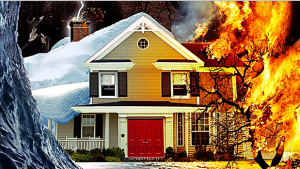 If you plan on getting home insurance, it is vital that you read the fine print and try to understand the content fully so you do not end up making a very costly mistake.
If you plan on getting home insurance, it is vital that you read the fine print and try to understand the content fully so you do not end up making a very costly mistake.
One of the viewers, Aisha, lost her home recently in a fire. She shared her storey with ANC’s “On The Money.” She said her family has home insurance, but the exclusions they did not pay attention to on the fine print before meant they got zilch on insurance claims.
Before the fire decimated their family’s home, both Aisha and her husband initially intended to sell their home when they retire after a few years once the U.S. market has recovered.
Salve Duplito, ANC’s residential financial adviser, said that the biggest and also costliest mistake that people make when getting property insurance is not knowing what the exclusions are on the coverage.
“Contracts are boring. They are written in fine print and in legalese, but here’s a thought: How difficult would it be to change the slant of legal contracts to protect the consumer, rather than the corporation? All it takes is better font size and easy to understand English,” she said.
According to Duplito, while such a change may seem simple, it is not going to happen, especially if consumers do not really make a big deal out of it.
If you have such a contact and you will be stuck to it, there are three things you will need to watch for in a home insurance contract, according to property sales coach Carl Dy. These are: amount of coverage; exclusion; and protection against fire, flooding, earthquake, force majeure, etc.
Additionally, try to double-check on whether your insurance covers your from depreciation, said Dy.
“Most insurance companies deduct depreciation from claims payout, unless you get a cover based on replacement value rather than sound value,” Augustus Ferrerria, president of MoneyDoctors Inc., said.
What this means is that if you get home insurance, make sure to consider how much the overall cost to rebuild your home would be instead of buying coverage that only costs the amount of your mortgage. That is usually just 80 percent of your home’s value without even taking into account its depreciation.
You should try to revisit the coverage you have often, especially if you are planning to expand your home. Of course, this means there will be additional payment or you could get a professional liability insurance to cover those unnecessary expenses from happening.
Another thing to consider in home insurance is the protection of lost contents like jewelries, antiques, computers, and other valuable stuffs. To make things easier, especially when filing for claims, take photographs of your home’s content and archive them.
Another important point that Ferrerria and Dy added is that if your property is not totaled, the payout you get will only be a fraction of what you expect it to be.
Ferrerria said that engineers often say that the usable part is usually the home’s foundation. Make sure to specify that if any eventualities occur, that the foundation of the home is not included with the calculation on the summation of benefit.
He advised that you should treat the insurance adjuster fairly well when they make their estimates, especially since the adjuster will be both on your side and that of the insurance company’s. Part of their mandate is to be in the middle and to be impartial.
Make sure to always read your contract and understand its content, said Duplito. Do not be afraid to look stupid and ask what you do not understand. There is no point in looking smart if you are going to lose some money over it.